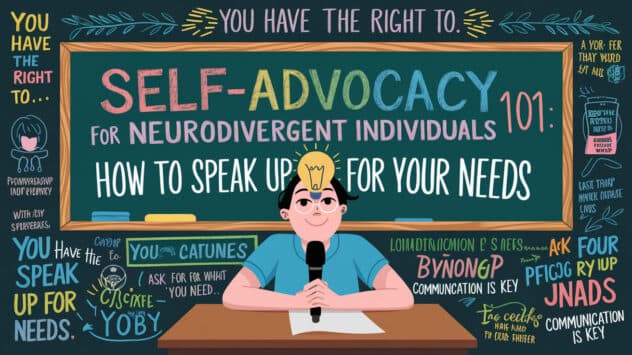
Neurodivergence in the Workplace: More Than Just a Buzzword
Neurodivergence is like a rare, hidden gem that everyone says is valuable, but most people don’t quite know how to polish it. The reality is, 15-20% of the global population is neurodivergent, we’re talking ADHD, autism, dyslexia, and other cognitive variations that make the world an interesting place. And yet, while the corporate world is slowly waking up to diversity and inclusion, neurodivergence is often an afterthought. You wouldn’t overlook a whole fifth of your workforce, would you? So, let’s talk about how to create an inclusive workplace for neurodivergent employees. (Hint: It’s simpler than you think).
We’ve all heard the word “diversity” thrown around a lot lately, right? But when most people say “diversity,” they mean gender, race, and sometimes even age. Where’s the inclusivity for neurodivergent people? The ones who think differently, process information differently, and yes, sometimes even do things a little differently, and that’s okay!
Let’s take a look at some of the big names that have nailed neurodiversity in the workplace. Microsoft and SAP are prime examples. They’ve been paving the way for neurodivergent employees and it’s time more companies took notes (not literally, though, sometimes we just need a different way to access information).
Microsoft, for instance, has their Neurodiversity Hiring Program, which focuses on hiring talent with ADHD, autism, and dyslexia, offering flexible interview processes and long-term support. SAP has also got their act together by building a Win-Win Potential of Hiring Neurodivergent Workers program. JPMorganChase launched their Office of Disability Inclusiion.
So employees don’t just get hired, they get to thrive. And here’s the kicker: embracing neurodivergence isn’t just the right thing to do, it’s smart. These companies are tapping into untapped talent and boosting productivity by encouraging people to use their strengths, not just fit into a box.
1. Start with the Conversation (It’s Not That Scary)
Imagine a workplace where everyone is encouraged to talk about what makes them tick. Mind-blowing, right? But seriously, it’s time to break the silence. Neurodivergence doesn’t need to be whispered about in the corner of the office like it’s the office’s biggest secret, right up there with the mystery of who’s been stealing the stapler. Open up, and ask employees what they need. Whether it’s a sensory-friendly space, flexible hours, or even clearer instructions, creating an open dialogue is key.
And while you’re at it, in the US, under the Americans with Disabilities Act (ADA), employees with neurodivergent conditions have certain rights. That means reasonable adjustments in the workplace are not just nice-to-haves, they’re required by law. So, don’t hesitate to offer the support your team members might need! For more details on how this works, you can explore the ADA National Network for all the specifics.
Now, let’s cross the pond and look at other English-speaking countries making strides in inclusivity for neurodivergent employees:
- UK:
In the UK, the Equality Act 2010 provides strong legal protections for neurodivergent individuals. Employers are legally required to make reasonable adjustments at work to accommodate employees with conditions like ADHD, autism, and dyslexia. For further information, check out the Equality and Human Rights Commission. - Australia:
Under the Disability Discrimination Act 1992, employers are required to make reasonable adjustments for employees with disabilities, including those who are neurodivergent. Learn more about your rights and responsibilities as an employer here. - Canada:
In Canada, the Canadian Human Rights Commission enforces the rights of neurodivergent employees to receive workplace adjustments and ensures protection against discrimination. For more details, visit here.
So, no matter where you’re based, there’s a legal framework in place to support neurodivergent employees. The conversation is just the first step, let’s make sure we’re all listening!
2. Adapt to Flexible Working
Do we want a workplace where the constant buzz of distractions makes everyone feel like they’re in a game of ‘Whack-a-Mole? Ah, sweet peace. Flexible working hours or the ability to work remotely are like magic for neurodivergent employees. These small changes can significantly boost productivity. Let’s face it, would you rather be working in a quiet, distraction-free zone or in a bustling office where everyone is on a different wavelength? No brainer, right?
3. Provide Clear Communication (For Everyone’s Sake)
Neurodivergent people might not always be able to interpret instructions the same way neurotypical folks do. Surprise, surprise. Written instructions, diagrams, or even a checklist can be game-changers. It’s not about making things harder; it’s about making sure everyone is set up to succeed. Plus, you’ll probably avoid that awkward situation where someone just didn’t understand what you meant, but everyone’s too polite to admit it.
4. Focus on Strengths, Not Weaknesses
Now, this is where things get interesting. ADHD, autism, dyslexia aren’t problems to fix. They’re just different ways of thinking. And with different thinking comes unique strengths, whether it’s creative problem-solving, attention to detail, or the ability to see connections others don’t. Why not harness these superpowers, instead of trying to make everyone think the same way?
5. Make Room for Sensory Sensitivity (Because Lights Can Be Evil)
Bright lights, loud noises, uncomfortable textures, it’s like the sensory version of a horror movie for people with autism or sensory processing disorder. So, let’s make sure we’re not inadvertently torturing our neurodivergent colleagues. Quieter workspaces, dimmer lights, or even the ability to use noise-cancelling headphones could make all the difference in the world. So, be a hero and think about how you can make the environment a little less terrifying.
What Employees Can Do – Advocate for Yourself (Yes, Seriously)
We get it, asking for adjustments can feel like you’re asking for a trip to the moon. But here’s the deal: advocate for yourself. Let your employer know what you need. Whether that’s more flexible hours, quieter workspaces, or even just a clearer way of receiving instructions, speak up. It’s not asking for too much; it’s asking for what you need to succeed. And trust us, your employer will appreciate the heads-up (even if they don’t always know how to respond immediately).
The Role of Medication – Is It Always Necessary?
Let’s clear something up: medication is not always the answer. Sure, some neurodivergent individuals take medication, like ADHD stimulants, but not everyone needs, or wants, to rely on pills. And sometimes, even workplaces may have restrictions or guidelines around the use of certain medications.
Alternative therapies, such as neurofeedback, mindfulness, or even CBT (Cognitive Behavioral Therapy), are equally effective at helping neurodivergent individuals focus and manage emotions, without reaching for the pill bottle. We’re all about finding what works for you, whether that’s medication or alternative treatments. Employers should embrace the fact that neurodivergent employees don’t always need a one-size-fits-all solution.
Final Thoughts – Neurodivergence Isn’t a Disability, It’s a Superpower
Look, here’s the truth: neurodivergence is not a disability, it’s a superpower. Whether it’s Einstein, Steve Jobs, or Temple Grandin. All of these individuals had neurodivergent traits, yet their contributions changed the world. Neurodivergence is just a different way of processing information, and with the right support, it’s a strength, not a weakness. We even wrote about that here.
So, let’s ditch the idea that neurodivergence needs to be “fixed.” It’s time to embrace it, celebrate it, and make workplaces work for everyone. After all, when neurodivergent employees thrive, so does the entire company. Everybody wins.
Please note: While we share information and tips to support your journey, we are not health professionals. Always consult a qualified healthcare provider before making any changes to your wellness routine. Your health is personal, and we’re here to help guide you, not diagnose or treat.





